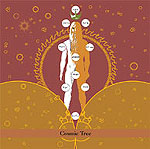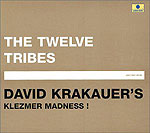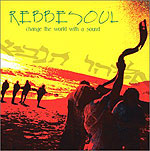
The changing sound of klezmer
|
This review first appeared in the Winter 2002 issue of Turbula.
So just what is klezmer music anymore, anyway? Some recent releases offer specific examples.
Long Beach's Rabbinical School Dropouts may be one of the best representations of the future of klezmer. For they are not a conservationist outfit, like say the Klezmer Conservatory Band. Nor are they primarily a Jewish rock 'n' roll band, like the Klezmatics.
Instead, the Rabbinical School Dropouts are a uniquely American combo, mixing klezmer with jazz in nearly equal helpings. "Cosmic Tree," their first album on John Zorn's avant-garde Tzadik label (which has never had a bad release) shows them as much more of a serious art band than their earlier independent releases.
Leaders/brothers Michael and Jon-Jon Friedmann wrote or co-wrote all the music here, and it ranges from the introspectively mystic ("Integraton") to swirling dervish jazz ("Mosquito From Megiddo"). The closing number, "Semitic Slam," is a percolating bit of New Orleans Jewish street funk. And "Sweet Beat" combines Yiddish melodic and harmonic structures atop an Indo-African rhythm – and they make it work!
Despite the wildly experimental nature of much of the music here, the instrumentation actually hews fairly closely to a traditional klezmer band: clarinet, guitar, piano. Of course, the addition of congas and tabla is bit outside the klezmer norm!
But the overall feeling of this release is of a very natural, organic extension of what's come before, of a stretching of klezmer into the future in a very healthy manner.
David Krakauer's Klezmer Madness takes the same wide-open and spirited approach to fusing klezmer and jazz that the Klezmatics take to the klezmer-rock arena. But more than the Klezmatics or the Rabbinical School Dropouts, Krakauer and Co. stay closer to the roots of klezmer on their album "The Twelve Tribes."
This is illustrated both on their cover of the traditional "The Kozatzke / Der Ziser," which works its way to an almost-insane speed but with perfect timing and pitch, and in the medley of TV theme songs, "Television Frailachs." Opening with a riff from the "The Munsters" theme, the song quickly devolves into a hilariously campy cover of a half-dozen or so classic themes from the 1960s – and yet is also an absolutely straight klezmer song throughout.
Even on "As If," which is in large fashion an electronica piece, there is still that dominant element of klezmer front and center.
Rebbe Soul (Bruce Burger) keeps moving deeper and deeper into the soul of Judaism with each new album. By his own statements, he's not a klezmer artist. Yet his pan-Judaic music certainly takes in huge swaths of klezmer. And even what isn't klezmer reflects a Jewish identity that can only illuminate the larger tradition klezmer swims in.
His latest album, "Change the World With a Sound," is deeply immersed in Mideastern mysticism; it is kabbalistic and often trancelike. His "Kaddish" is a sort of over-arching paean to Jewish prayer.
Yet the thing about Rebbe Soul is there is no predicting what he'll do. The opening track is a kind of Jewish rap – the main theme has a heavy Mideastern twang to it, then Rebbe Soul starts a half-rap, half-sung refrain atop it. And even "Kaddish," the name of a Jewish prayer performed at synagogue and during mourning, has non-Jewish streaks running through it – even Arab and Turkish influences.
This is music as brave as it is visionary.
John Zorn is a mighty figure on the musical landscape. A hero to both the alt-rock and avant-jazz crowds, you'd have to put him alongside such influential innovators as Kip Hanrahan, Bill Laswell and Henry Threadgill for sheer audacity. Zorn is also the founder and director of the Tzadik label, which has released some of the best experimental jazz and klezmer albums of the past decade.
And so a new Zorn release is always an interesting look inside the mind and heart of one of the leaders of the ongoing Jewish renaissance (although as prolific as he is – only Laswell seems able to record as much material as Zorn – just keeping up with his recorded output will drive you into the poorhouse).
"I.A.O." is a spiritual explorative that simply cannot serve as background music – listening to this album is to immerse yourself in a religious ritual.
Not that it's formal or traditional. This album is most reminiscent of Milton Cardona's re-creation of a Santeria Mass ("Bembé"), or Wynton Marsalis' jazz reading of a Protestant revival meeting, "In This House, On This Morning." In Zorn's hands, as in the above two examples, the music and the spiritual aspect co-exist in equal measure. Or to put it another way, the music is the spiritual.
Unlike either of the other two examples, however, Zorn's "I.A.O." exists as a collection of individual pieces that strung together create a spiritual experience. Both stylistically and thematically, each song is distinct in structure, approach and instrumentation. From a raga-like trance song ("Sex Magick") through the chants of "Lucifer Rising" to the death metal of "Leviathan," this is not an album that will ever lull you into anything.
What ties all this together, what merits its inclusion in a set of klezmer reviews is the overriding theme of the Kabbala, or Jewish mysticism. The packaging draws on deep springs of Kabbala, and the mysticism inherent to most of the music (save "Leviathan"), can also be ascribed to an interest in the Kabbala.
This is obviously music that is very out-there – as far from mainstream klezmer as it is from Count Basie. And yet, it's part of the fabric of Jewish music – on the periphery, perhaps, but given Zorn's role in nurturing the klezmer revival through his Tzadik label, well worth checking out for those with an exploratory streak to their soul.



